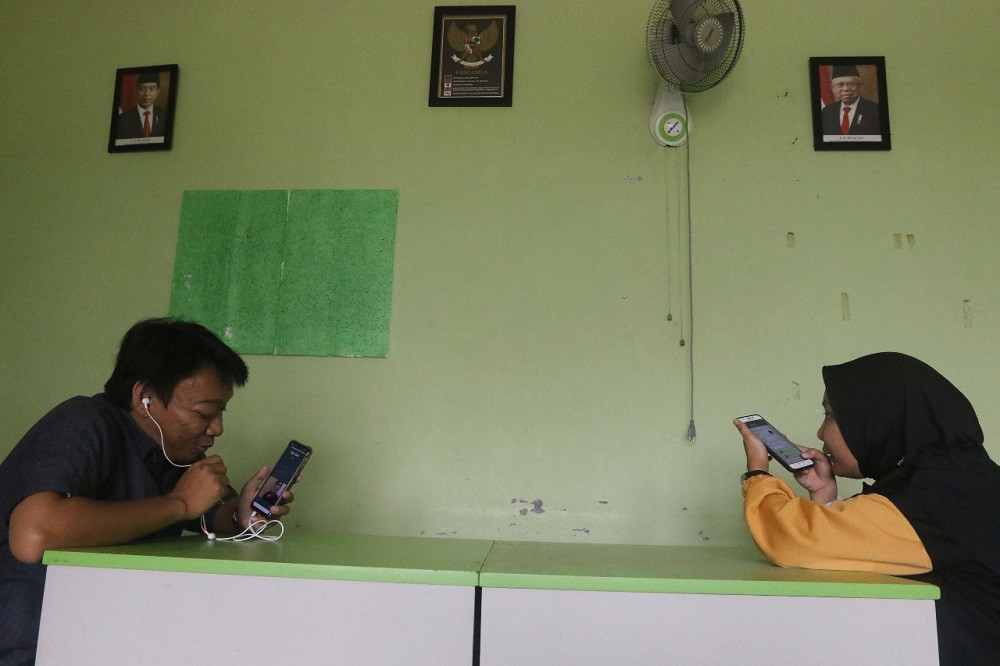Popular Reads
Top Results
Can't find what you're looking for?
View all search resultsPopular Reads
Top Results
Can't find what you're looking for?
View all search resultsImpacts of at-home learning not negative for all student levels: IPK study
A study by a psychology association has found that at-home learning does not necessarily have a negative impact on student wellbeing across all education levels.
Change text size
Gift Premium Articles
to Anyone
T
he government has announced that schools could reopen in January if local administrations, schools and parents agreed to resume classroom learning.
Education and Culture Minister Nadiem Makarim told a virtual press conference on Nov. 20 that the idea emerged from concerns about the negative impacts of online learning at home, such as increased dropouts for economic reasons, decreasing attendance in early childhood education (PAUD), stress for children from a lack of peer-to-peer interaction and the increasing rate of domestic violence.
A study by the COVID-19 containment task force of the Indonesian Clinical Psychology Association (IPK), however, has found that at-home learning did not have a significantly negative impact on the mental wellbeing of children.
Involving 15,304 children in 32 out of 34 provinces in November, the study explored the impacts of three types of learning on the children’s emotional, mental and overall general wellbeing: at-home learning, classroom learning and a mix of at-home and classroom learning
The study found that elementary and junior high school students exhibited fewer emotional issues during at-home learning, while senior high school and vocational school students presented no differences in their emotional wellbeing between the three learning methods.
However, the study found that both junior and senior high school students showed signs of trauma from the mixed learning method, while vocational school students showed signs of trauma from at-home learning.
Both elementary and junior high school students showed the highest level of mental wellbeing during at-home learning, while senior high school students recorded the highest mental wellbeing using the mixed learning method.
The study thus concluded that at-home learning was better for the mental wellbeing of children than either the classroom or mixed learning methods.
The IPK said in a statement that the results of the study showed that at-home learning did not create more stress for children compared to the other learning methods.
Moreover, the study also found that the current mental wellbeing of student respondents was almost the same with pre-coronavirus levels, further indicating that at-home learning did not have a direct impact on their mental health.
Based on these results, the IPK’s COVID-19 containment task force has urged the government to postpone classroom learning, at least until the national positivity rate had fallen to below 5 percent.
The national COVID-19 task force revealed that Indonesia’s positivity rate for last week’s 7-day rolling average was 18.1 percent, far above the 5 percent recommended positivity level of the World Health Organization (WHO).
The positivity rate measures the percentage of all tests returning a positive result, so a high positivity rate indicates a high level of virus transmission in a country.
“The psychological impacts of at-home learning cannot be a reason [for reopening schools], as this has not been proven,” stated the IPK.
However, the association’s COVID-19 containment task force said that the pandemic had widely disrupted human lives across the globe and could affect the mental health of communities.
It therefore suggested that the government pay attention to mental health in the education community during at-home learning, including teachers, students and parents.
The IPK task force also recommended several potential measures, such as improving the skills and capacity of teachers in conducting at-home learning activities, providing Psychological First Aid (PFA) to teachers and providing parents and students with easy-to-follow at-home learning modules to reduce the burden on their mental health. (jes)
Editor’s note: This article is part of a public campaign by the COVID-19 task force to raise people’s awareness about the pandemic.










